
Freelance writing is a great way to control your own schedule and make money in a flexible way. As a freelance writer, you can build an income stream that lets you work as much or as little as you want to.
So how do you find freelance writing jobs?
This article will give you our top 30 tips on how to get started as a freelance writer.
How to Get Freelance Writing Jobs: Our Top 30 Tips
Tip #1: Build a Portfolio
Every freelance writer needs a strong portfolio. Read through your past work and pick out some samples that you can show to potential clients.
If you don’t have much writing experience yet, that’s fine! You can start with any work you’ve done in the past, even school essays and blog posts, as long as they demonstrate your writing skills.

Tip #2: Create Your Own Blog
Start writing and publishing blog articles on topics that you’re interested in. Over time, you can build a following of readers and potential clients who know that you’re a skilled freelance writer. Your blog posts can also be great writing samples to add to your portfolio.
Tip #3: Use a Grammar Checking Tool
Your clients will expect grammatically correct writing that reflects well on them.
Using a grammar checking tool such as ProWritingAid will help you ensure that your writing is polished and professional before you show it to clients.
Tip #4: Join a Content Marketplace
If you’re a newer writer, joining an established content marketplace like iWriter or Textbroker can be a great way to get started as a freelancer. You’ll get ratings and feedback that you can share with potential clients.

Tip #5: Create a “Hire Me” Page
Create a webpage to show clients what freelance writing services you offer. You can create a free website using a site like Squarespace or Wix, or you can simply set up a “Hire Me” page on your blog.
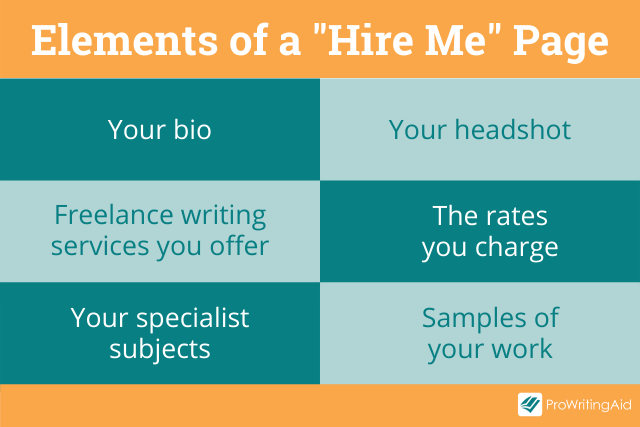
Tip #6: Take a Course on Freelance Writing
There are many classes that can give you a boost in the freelance writing business. If you’re curious on where to find a class, check out our article on the best freelance writing courses.

Tip #7: Make a Freelance Writer LinkedIn Profile
Many people go to LinkedIn when they need to hire a freelance writer. You want your profile to show up in that search bar. Upload a professional picture and a short summary of the services you offer, and make sure you use the keywords “freelance writer,” “copywriter,” “blogger,” or “freelancer” in your profile.
Tip #8: Check the Job Ads on LinkedIn
There are plenty of freelance writing job ads on LinkedIn, and most are reputable opportunities.
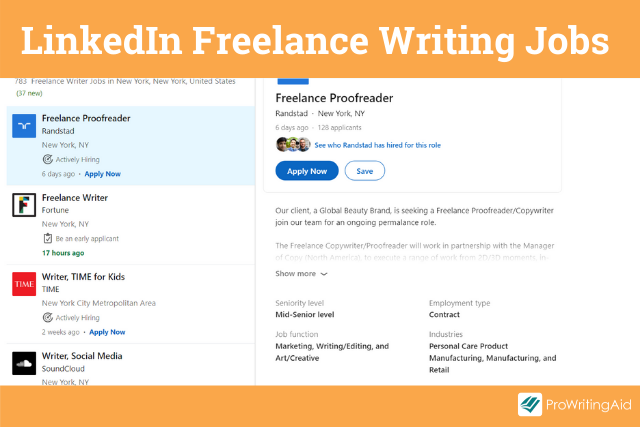
Tip #9: Search for Opportunities on Twitter
In our day and age, social media is a great place to find freelance writing opportunities. One way to do this is by searching the hashtags #freelancewriter, #copywriter, and #freelanceblogger.
You can also connect with other freelance writers and share your stories and experiences.
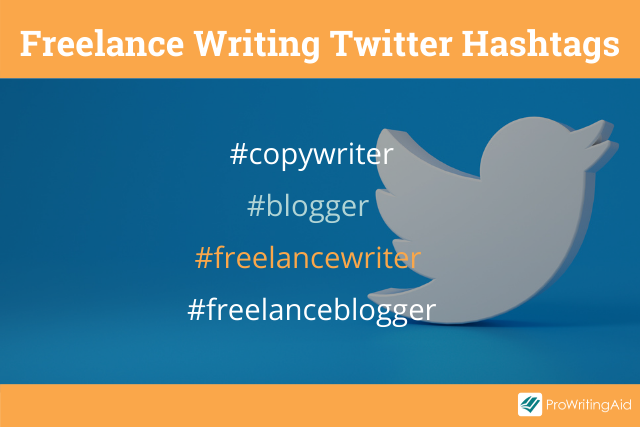
Tip #10: Follow the Right Twitter Accounts
There are plenty of Twitter accounts that regularly post freelance writing gigs. Some good accounts to start with include @Writing_Gigs, @WritingJobGigs, and @TweelanceWriter.
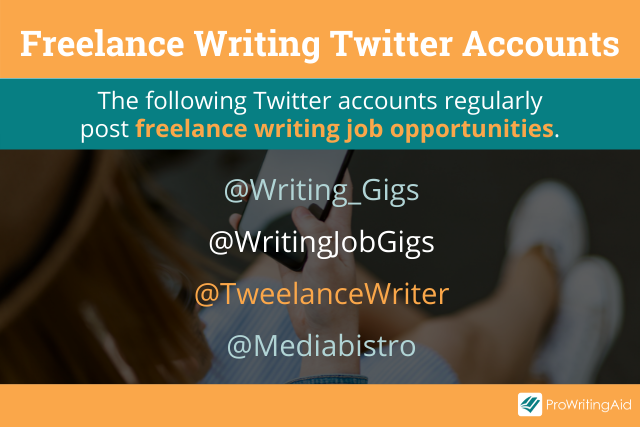
Tip #11: Join Facebook Groups to Meet Other Freelance Writers
Type “freelance writing” into Facebook’s search bar to find communities of other freelance writers. Share any freelancing opportunities you know of that might be right for someone else in the group, and they’ll do the same for you.
Tip #12: Look Through Listings on Craigslist
Craigslist has a lot of opportunities for burgeoning freelance writers. However, anyone can post a listing on Craigslist so make sure you vet clients carefully and only take jobs you trust.
Tip #13: Browse Listings on SearchTempest
SearchTempest is a search engine that helps you find paid freelance writing jobs on Craigslist, eBay, Amazon, and Oodle.
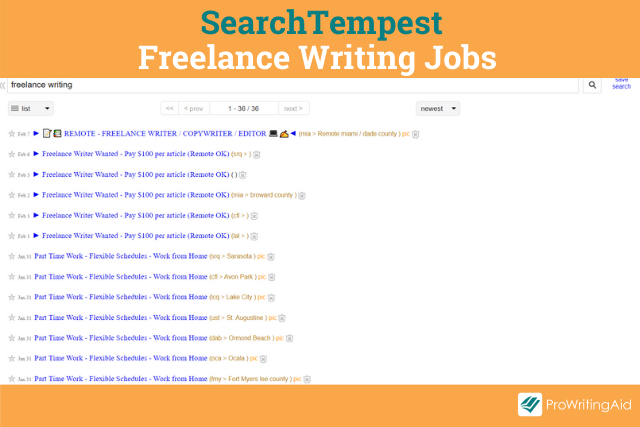
Tip #14: Become a Flexjobs Member
Flexjobs is a site that manually screens premium freelance writing jobs which ensures that you get high-quality opportunities that pay well. Paying a small annual membership fee will give you access to a trove of remote positions.
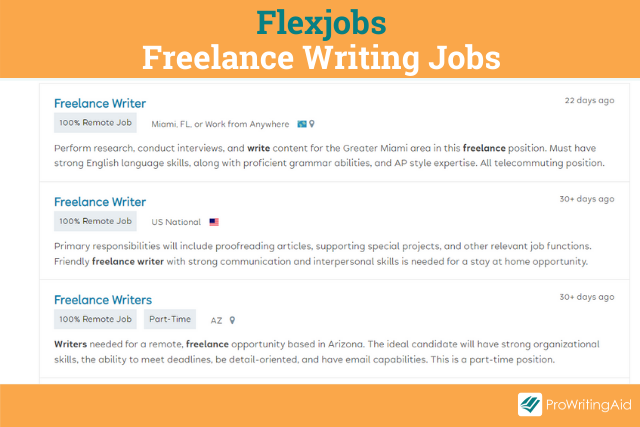
Tip #15: Search for Opportunities on Mediabistro
Mediabistro has various media-related jobs, many of which are freelance writing gigs.
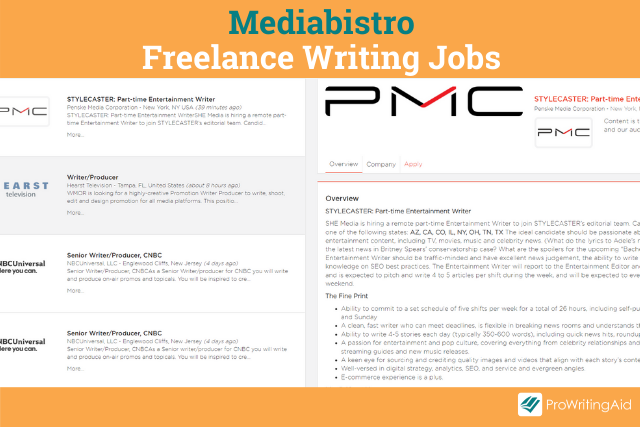
Tip #16: Bid for Projects on Freelancer
Freelancer is a platform where you can bid on projects. You need a premium account to continue bidding, but you can try it out for free.

Tip #17: Join Hubstaff Talent
Hubstaff is a zero-fee platform for freelancers. It works similarly to Freelancer, and it's free to use.
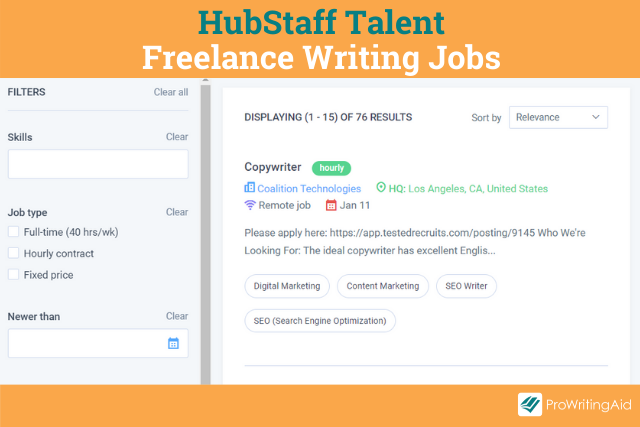
Tip #18: Check Curated Lists of Freelance Writing Jobs
If you Google “Freelance Writing Job Board,” you’ll find curated lists of freelance writing jobs to choose from.
Tip #19: Reach Out to Businesses
You don’t have to wait for clients to post job listings—you can initiate the conversation. Contact brands, blogs, and businesses to ask if they need content.
Tip #20: Pitch to Job Board Ads
You can pitch to job boards, such as ProBlogger Jobs, so potential clients can see that you’re available.
Tip #21: Pitch to Editors and Publications
Many publications pay writers for articles. Get to know the magazines that are open for pitches and come up with article ideas based on the topics they specialize in.
Tip #22: Keep in Touch with Your Past Clients
Keep in touch with your clients even after you finish working for them. Ask how they’re doing and if there’s anything new you can help them with.
Establishing long-term client relationships will benefit both you and your clients.

Tip #23: Ask for Referrals
Don’t be afraid to ask your past and current clients for referrals. Word of mouth is one of the most effective ways to build a client base.
Tip #24: Use a Project Management Tool
As a freelancer, it can be difficult to manage your time and keep track of all your jobs.
Using a project management tool such as Trello, Asana, or Evernote can help you keep everything organized.

Tip #25: Choose a Communication Platform
Choose a platform for keeping in touch with your clients, such as Slack, Skype, or Messenger.

Tip #26: Use an Accounting and Invoicing Tool
You’ll need a reliable way to charge your clients for the work you do. We recommend trying Paypal, Wise, or Wave for sending invoices and managing your budget.

Tip #27: Watch Out for Freelancing Scams
Unfortunately, there are people who might try to get you to work for them without paying you afterwards. Whenever a new client approaches you, ask questions about who they are and research their reputation. If you have a bad feeling about the opportunity, walk away.
Also, whenever you accept a freelancing job, it’s best practice to make sure there’s a contract or some form of written agreement.
Keep a record of the terms of each freelancing gig: the work you’re expected to do, the deadlines for that work, and the amount the client has agreed to pay you.

Tip #28: Know Your Rates
As of 2021, the average salary of a writer in the United States is around $22 an hour. You can decide how much to charge based on your skills and experience.
Tip #29: Aim to Master Your Niches
The best writers are the ones who immerse themselves in the topics they write about. It’s better to master a niche (or even several) than to be a jack-of-all-trades.
Are you interested in writing about travel? Healthcare? Technology? Art? Choose your niches and aim to master them.

Tip #30: Believe in Yourself
It can be scary starting out as a freelance writer, especially if you’re used to a stable job with a boss telling you what to do. Don’t be afraid!
Every freelance writer starts somewhere. Keep writing, learning, and looking for new opportunities, and eventually you’ll be a pro.
Start Looking for Freelance Writing Jobs Now!
Now you have all the tips and tricks you need to start working as a freelance writer.
Do you have any favorite sites to search for freelance writing jobs? Let us know in the comments.


